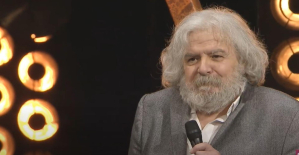As a young man, Syd Dallas drew the adventures of the greatest superhero of all time, Domain. A few decades later, he is delighted with the success of the cinematographic adaptations... even if he does not touch his share of the cake. An unfair situation that his son decides to correct. Will he be able to convince his father and triumph over the system?
Although it is a fiction, Public Domain is obviously inspired by the legendary cartoonist Jack Kirby (1917-1994, co-creator of the Avengers and the X-Men), whose copyright Marvel refused to recognize. . A situation that continues today because the screenwriters and artists working for the "House of Ideas" or DC Comics are still not the owners of their works.
Former journalist turned author for Marvel (Daredevil, Spider-Man, Howard the Duck) and DC (Batman), Chip Zdarsky knows well the cogs of the industry on which he takes a lucid look but without animosity. If collaborating with the “Big Two” certainly opens doors, creating comics independently – and keeping the intellectual property – remains essential, according to him. A fascinating subject that the Canadian agreed to detail in Figaro, on the occasion of the release of the first volume of Public Domain at Urban Comics, last April.
LE FIGARO. - What was the starting point of Public Domain and why did you want to tackle the subject of intellectual property in the comics industry?
Chip ZDARSKY. - The starting point was my Mangasplaining podcast. Japanese comics have such a wide range of topics...I started thinking about my own interests outside of genre comics. I love, for example, reading about the comic book industry, its history, so it became pretty clear that I had to write about it.
You are best known as a comic book writer. Why did you also want to draw and color Public Domain?
After finishing Sex Criminals (3 volumes out of 6 published by Glénat, publication stopped, editor's note), I asked myself if I wanted to illustrate a new series. It takes an incredible amount of work and it's not easy physically... But since the story of Public Domain is about intellectual property and tensions between different parties, I wanted to make sure I was the only one creator, sole owner.
Public Domain was first published in a Substack newsletter. How do you view this experience?
It was great! Drawing a graphic novel can seem daunting, but putting out a few pages every two weeks makes the process much easier. I also sincerely like the community, which is very different from Twitter. Nobody pays a few bucks a month to yell at me on Substack.
Public Domain was later published in hard copy...
I like the digital format for ease of publication. However, this does not seem to me to be a sector in hypergrowth. I read most of my books digitally, it's the easiest way for me to manage a library, but I also like the single issue format (partition of about thirty pages in general, editor's note), maybe out of nostalgia.
Comic book writers don't really benefit from the commercial success of Marvel/DC movies. Why is the public not moved by it, in your opinion?
People may get outraged on the internet about the industry, but they will still buy their movie tickets to see the movie. Also, the more time passes, the more people are involved in these works. There are the original creators and others who contribute their stone to the building, whether on the side of comics, cinema or television. All of these additional layers muddy the waters for the audience.
Do you think comic artists and writers are treated better by Marvel/DC today than they were in the days of Jack Kirby?
There have been ups and downs over the years. Today, creators know the value of their creations. Kirby had no idea he would be responsible for such a driving force in pop culture, a source of billions of dollars for the companies involved...
Now, authors have more leverage in negotiations and, even better, they can not create for others and make creator-owned comics ("belonging to the creator", unlike the Marvel / DC series, editor's note).
Exactly, Public Domain, Newburn and Sex Criminals are creator-owned series...
It allows me both creative and commercial control. It's hugely satisfying to create something from scratch, even if it's harder than inheriting a character that's "preloaded" with emotional connections to the reader.
You say you made more money with Sex Criminals and Public Domain than with all your Marvel/DC series. So what does a collaboration with these major publishers bring?
Sex Criminals is clearly an anomaly! It was a massive, life-changing hit and not all creator-owned series reach that level. I will never reach those heights again. Every six months this comic keeps paying me and the rest of my creator-owned work just adds to it.
If you create a bestselling comic for Marvel or DC, it definitely makes money for you, but in a more fleeting way because comics don't tend to stay in print for long due to the high volume of releases from these companies. So it is economically worthwhile. Adventure can also be fun, as long as you understand and accept the necessary compromises. It also has the added benefit of converting readers from those big publishers to your creative work. I don't know if Matt Fraction could have started Sex Criminals - or had it published - without his years at Marvel.
Did the release of Public Domain cause the industry to cringe?
No! At least nothing I've heard of. Look, the people I deal with at Marvel and DC are comic book fans. No one in my orbit wants to harm creators. For the most part, they face the same problems as creators. A career in comics, at almost any level, does not provide stability or financial security. They know the system robs people of merit and money. It's a public record. I am not surprising anyone with my "revelations" about the comics industry in Public Domain!
In your recent interview given to the First Print podcast, you said you had 8 side projects, with a goal of 3 by the end of the year. Where are you?
I'm at four! Although one of them is Public Domain, which in itself requires full-time work.
You originally took the pseudonym of Chip Zdarsky to distinguish your activities as an author from your work as a journalist, but it seems that Chip has become a character in his own right… How is he different from Steve Murray, your real name?
“Chip” started out as an actual character. I "interviewed" him for my college newspaper and he was a sad, friendless cartoonist. When I started publishing comics under this name, I played the character a bit at comic conventions. I wore fake glasses and a cowboy hat for some reason... It was fun being someone else!
Nowadays, Chip and Steve are quite similar, although it's nice to just be "Steve" at home with my family and old friends. Having a pseudonym allows you to split your ego. Chip's successes and failures are another guy's.
Why did you also use the nickname Todd Diamonte?
Ha! It's actually Todd Diamond. I don't know how [this typo] got on my Wikipedia page... I created an unlucky financial adviser and made videos for the Financial Post as this character. I had an interesting career!
Public Domain (volume 1), by Chip Zdarsky, translated by Jérôme Wicky, Urban Comics, 128 pages, 10 euros (launch price, until July 7, 2023).

 B:SM will break its investment record this year with 62 million euros
B:SM will break its investment record this year with 62 million euros War in Ukraine: when kyiv attacks Russia with inflatable balloons loaded with explosives
War in Ukraine: when kyiv attacks Russia with inflatable balloons loaded with explosives United States: divided on the question of presidential immunity, the Supreme Court offers respite to Trump
United States: divided on the question of presidential immunity, the Supreme Court offers respite to Trump Maurizio Molinari: “the Scurati affair, a European injury”
Maurizio Molinari: “the Scurati affair, a European injury” Irritable bowel syndrome: the effectiveness of low-carbohydrate diets is confirmed
Irritable bowel syndrome: the effectiveness of low-carbohydrate diets is confirmed Beware of the three main sources of poisoning in children
Beware of the three main sources of poisoning in children First three cases of “native” cholera confirmed in Mayotte
First three cases of “native” cholera confirmed in Mayotte Meningitis: compulsory vaccination for babies will be extended in 2025
Meningitis: compulsory vaccination for babies will be extended in 2025 Thanks to intelligent cameras, RATP will indicate the least crowded trains on line 14
Thanks to intelligent cameras, RATP will indicate the least crowded trains on line 14 Dubai begins the transformation of Al-Maktoum to make it the future “largest airport in the world”
Dubai begins the transformation of Al-Maktoum to make it the future “largest airport in the world” When traveling abroad, money is a source of stress for seven out of ten French people
When traveling abroad, money is a source of stress for seven out of ten French people Elon Musk arrives in China to negotiate data transfer and deployment of Tesla autopilot
Elon Musk arrives in China to negotiate data transfer and deployment of Tesla autopilot Two people arrested for attempted damage to classified property at the Musée d’Orsay
Two people arrested for attempted damage to classified property at the Musée d’Orsay Death of composer Jean Musy, at 76, author of the music of Papy fait de la resistance, Les Champs-Élysées
Death of composer Jean Musy, at 76, author of the music of Papy fait de la resistance, Les Champs-Élysées Fanny Ardant prodigious in The Wound and the Thirst
Fanny Ardant prodigious in The Wound and the Thirst Hospitalized for pneumonia, Véronique Sanson cancels her concert in Nantes
Hospitalized for pneumonia, Véronique Sanson cancels her concert in Nantes Skoda Kodiaq 2024: a 'beast' plug-in hybrid SUV
Skoda Kodiaq 2024: a 'beast' plug-in hybrid SUV Tesla launches a new Model Y with 600 km of autonomy at a "more accessible price"
Tesla launches a new Model Y with 600 km of autonomy at a "more accessible price" The 10 best-selling cars in March 2024 in Spain: sales fall due to Easter
The 10 best-selling cars in March 2024 in Spain: sales fall due to Easter A private jet company buys more than 100 flying cars
A private jet company buys more than 100 flying cars This is how housing prices have changed in Spain in the last decade
This is how housing prices have changed in Spain in the last decade The home mortgage firm drops 10% in January and interest soars to 3.46%
The home mortgage firm drops 10% in January and interest soars to 3.46% The jewel of the Rocío de Nagüeles urbanization: a dream villa in Marbella
The jewel of the Rocío de Nagüeles urbanization: a dream villa in Marbella Rental prices grow by 7.3% in February: where does it go up and where does it go down?
Rental prices grow by 7.3% in February: where does it go up and where does it go down? Europeans: a senior official on the National Rally list
Europeans: a senior official on the National Rally list Blockade of Sciences Po: the right denounces a “drift”, the government charges the rebels
Blockade of Sciences Po: the right denounces a “drift”, the government charges the rebels Even on a mission for NATO, the Charles-de-Gaulle remains under French control, Lecornu responds to Mélenchon
Even on a mission for NATO, the Charles-de-Gaulle remains under French control, Lecornu responds to Mélenchon “Deadly Europe”, “economic decline”, immigration… What to remember from Emmanuel Macron’s speech at the Sorbonne
“Deadly Europe”, “economic decline”, immigration… What to remember from Emmanuel Macron’s speech at the Sorbonne These French cities that will boycott the World Cup in Qatar
These French cities that will boycott the World Cup in Qatar Mercato: Fonseca coach of AC Milan? The Lille coach speaks
Mercato: Fonseca coach of AC Milan? The Lille coach speaks Ligue 1: OM with a three-way defense, Lens changes almost nothing
Ligue 1: OM with a three-way defense, Lens changes almost nothing Ligue 1: PSG officially crowned champion of France for the 12th time
Ligue 1: PSG officially crowned champion of France for the 12th time Ligue 1: Lyon offers Monaco and gets closer to a European place
Ligue 1: Lyon offers Monaco and gets closer to a European place

















